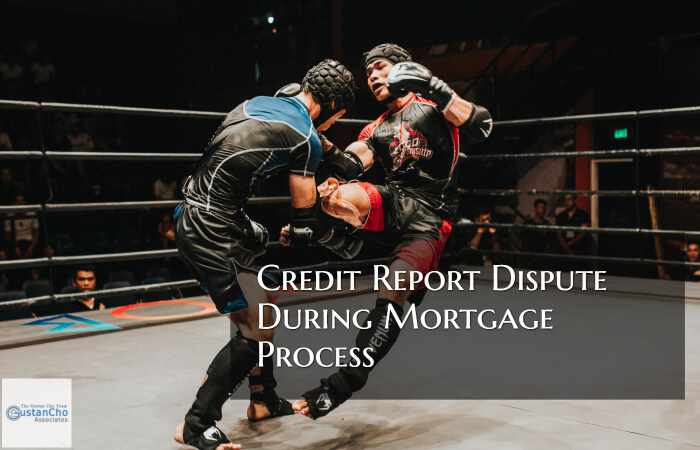Credit Disputes in Mortgage Process

This guide covers credit disputes in mortgage process. Folks who go through the credit repair process often do a credit disputes with the credit bureaus. Consumers do credit disputes by stating that they are disputing the derogatory information on their credit report. Under the federal Fair Credit Reporting Act, when a consumer does a credit dispute to the credit bureaus, the credit bureaus have 30 days to investigate the consumer’s dispute. Credit Bureaus need to notify the creditor to validate the derogatory information. If the creditor does not respond back in 30 days to the credit bureaus, the bureaus need to remove the dispute in question. This is a technique used often by many credit repair companies and consumers who do credit repair by themselves. Homebuyers who plan on applying for a mortgage need to pay special attention to mortgage guidelines when it comes to credit dispute. In this article, we will cover and discuss how credit disputes halt and impact the mortgage process.
What Types of Items is Credit Disputes in Mortgage Process Allowed?
Many consumers dispute all derogatory items from their credit reports hoping the creditor does not respond back. The credit bureaus need to remove the negative derogatory credit item if creditors do not validate the credit disputes. Often times this works. If the creditor responds back, consumers often dispute it again for the second go around and third go around.
Does Credit Repair Work
Many homebuyers often hire a credit repair company prior to getting ready to apply for mortgage. Going through credit repair prior or during mortgage process can often do more damage then good. Credit Repair does work but any credit disputes in mortgage process will halt the loan approval process. I have seen charge offs, collection accounts, bankruptcies, foreclosures, late payments, tax liens, and judgments be removed from credit reports.
There are many savvy creative credit repair consultants who know the ins and outs of loopholes and can get derogatory items completely removed from credit reports.
However, if home buyers planning on purchasing a home or refinancing in the near short term, there are strict policies on credit dispute. FHA, VA, USDA, Fannie Mae, Freddie Mac do not allow dispute during mortgage process. The mortgage process will be suspended until all disputes have been retracted. There are times where it is difficult to remove a dispute. Credit Scores often drops when consumers retract disputes. Click here to get more about credit repair for mortgage
How The Credit Dispute Process Work
Credit disputes are not allowed during the mortgage loan process. You can have credit disputes as long as you have documentation that the credit tradeline disputed is legitimate and you have documentation to prove it. Handling credit disputes during the mortgage loan process is critical as it can directly impact your ability to secure a loan and the terms you receive. Here are key steps to manage credit disputes effectively during this time:
Review Your Credit Report Early
Before applying for a mortgage, obtain a copy of your credit report from all three major credit bureaus (Experian, Equifax, and TransUnion). This will allow you to identify any inaccuracies or issues that need disputing.
Credit Dispute s in Mortgage Process on Inaccuracies Allowed
If you find errors on your credit report, credit disputes in mortgage process on inaccuracies is allowed. Dispute the inaccuracies with the credit bureau. It’s important to do this before you start the mortgage application process because disputes can take time to resolve, and unresolved disputes can delay or negatively affect your mortgage approval. When you file a dispute, include all necessary documentation that supports your case. This might include bank statements, letters, or legal documents. Clear and comprehensive proof can help resolve disputes faster.
Monitor Your Credit
After you’ve initiated disputes, check your credit report to see if the changes have been made. The credit bureaus typically have 30 days to investigate and respond to your dispute. Inform your mortgage lender of any disputes you are making, as this can affect their assessment of your creditworthiness. Some lenders require that all disputes be resolved before proceeding with the loan application. Disputing credit report errors can temporarily lower your credit score because the disputed accounts are sometimes excluded from your score calculation until the dispute is resolved. Discuss the timing of your disputes with a financial advisor or the lender to determine the best strategy for your situation.
Avoid New Credit Disputes in Mortgage Process
Once you’ve started the mortgage application process, avoid initiating new disputes unless necessary, which can cause delays. Lenders may require that disputes be resolved before moving forward with the loan. Knowing how credit disputes work can ease the stress of dealing with them during the mortgage process. Familiarize yourself with the guidelines provided by the Consumer Financial Protection Bureau or other financial advisory services. Handling credit disputes effectively requires proactive management and clear communication with credit bureaus and your mortgage lender. Ensuring your credit report accurately reflects your credit history before applying for a mortgage can save you time and money in the long run.
Mortgage Guidelines on Credit Disputes in Mortgage Process
Borrowers applying for a mortgage loan and have a dispute and the derogatory item has a credit balance of $1,000 or greater (total outstanding collections), mortgage process cannot proceed until the disputed item is retracted. Borrowers disputing a derogatory item that has zero balance are exempt from retracting disputes. Medical collection disputes are exempt. Borrowers can have an outstanding unsatisfied balance on any medical collection accounts and have a dispute. Medical disputes are exempt no matter how much the outstanding balance.
Retracting Credit Disputes in Mortgage Process Drops Credit Scores
Credit disputes in mortgage process needs to be retracted by the consumer by notifying the credit bureaus or creditors in order for the mortgage process to proceed. There are times where retracting credit disputes in mortgage process can be difficult. Retracting a credit disputes in mortgage process will lower credit scores. Depending on the consumer, a retraction of a credit disputes can drop a consumer’s credit scores by 80 points or more. I have seen this happen over and over again. Also, there are times where a creditor will not retract the dispute and leave credit disputes in mortgage process. This can take weeks if not months. Connect with our expert for your mortgage enquiry
Mechanics of Credit Disputes in Mortgage Process
When consumers dispute a derogatory tradeline, the credit bureaus automatically negates the negative factor from the credit scoring formula. Due to negating the negative factor, a credit dispute will often boost consumer credit scores. If consumers retract a credit disputes, during mortgage process the negative factor is factored back into the credit scoring formula so this will cause the drop of consumer credit scores. The amount of drop depends on the type of derogatory and the age of the derogatory tradeline. A loan officer should never issue a pre-qualification or pre-approval letter to borrowers if they notice any credit disputes in mortgage process.






Responses